Katherine Brook offers advice to wholesalers about the evolving bottled water category and how best to approach it as we enter the summer period
Sustainability is now a hot topic and consumers are being urged to drink less single-use bottled water, but 72% of the UK population are still happily consuming it.
As such, bottled water now accounts for 28% of all soft drinks sales – a demand that could be driven by many factors. The sugar levy, for example, has prompted consumers to be more considerate in their drink choice and a trend towards living a healthier lifestyle has boosted the variety of bottled water available, be it still, sparkling or flavoured.
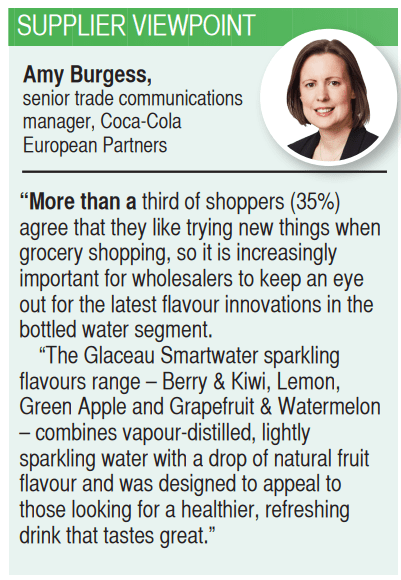 Amy Burgess, senior trade communications manager at Coca-Cola European Partners (CCEP), says the health and wellness trend has exploded in recent years, and, as a result, it is changing the way consumers shop. “We are seeing people continue to make positive changes to their lifestyles – drinking more water to stay hydrated or reducing sugar consumption from their diet – and bottled water very much fits in with this.”
Amy Burgess, senior trade communications manager at Coca-Cola European Partners (CCEP), says the health and wellness trend has exploded in recent years, and, as a result, it is changing the way consumers shop. “We are seeing people continue to make positive changes to their lifestyles – drinking more water to stay hydrated or reducing sugar consumption from their diet – and bottled water very much fits in with this.”
Similarly, Susanne Wright, head of marketing at Clearly Drinks, says that growing concerns over obesity and diseases associated with obesity has resulted in consumers migrating away from sugary juice and carbonated drinks, replacing them with healthier alternatives.
In response to this, brands are reformulating their drinks or extending their ranges, so that wholesalers can cater to the growing demand. For example, functional drinks brand VitHit has expanded its wholesaler listings, making the on-the-go drink more accessible for health-conscious consumers.
CCEP is also continuing to position the Glacéau Smartwater brand among consumers looking for healthier, refreshing drinks. Available in a 600ml PET bottle, Burgess says the new range of lightly sparkling drinks combines the “brand’s distinctive clean, crisp taste with a drop of refreshing fruit flavour”.
Highland Spring has also seen a rise in sales of its sparkling water, growing by 14.3% in value, following the relaunch of its 500ml variant last year. This was also supported by its £1m ‘Remarkabubble’ campaign, positioning sparkling water as an everyday treat no longer reserved for special occasions.
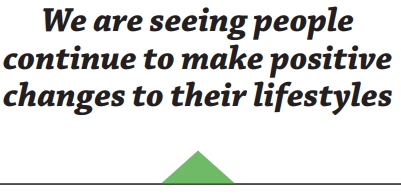 Sustainability
Sustainability
The war on plastic is very much a trend that is set to impact wholesalers, and as the environmental footprint of products continues to become a significant purchase driver for consumers, brands are working hard to make sure theirs is as small as possible.
At the end of last year, Britvic secured its first sustainably-linked credit facility in the UK and announced a long-term agreement with Esterform Packaging, for the supply of recycled plastic (rPET).
The facility is linked to the progress Britvic makes against its three sustainability targets, including the reduction of carbon emissions, reducing sugar content across the global drinks portfolio and making 50% of all plastic bottles in Great Britain and Ireland rPET. To date, the brand has already removed more than 1,400 tonnes of primary plastic from its supply chain, and 100% of its PET bottles, glass bottles and cans are recyclable.
The Buxton Natural Mineral Water range is also following in similar footsteps. Already 100% recyclable, by 2021 the brand’s entire range will also be made from 100% recycled plastic, which Ammad Durrani, head of category and shopper development at Nestlé Waters, says will help wholesalers meet the demands of environmentally-conscious shoppers.
Earlier this year, Danone’s water brands – Evian, Volvic, Aqua and Bonafont – launched WeActForWater, a set of actions, objectives and new investments aimed to bring healthy hydration and safe drinking water to people around the world.
The objectives include halving the amount of virgin plastic used by the water brands; reaching 50% rPET use worldwide and 100% across Europe in 2025; and accelerating towards carbon neutrality in Europe by 2025, with Evian and Volvic becoming carbon neutral this year.
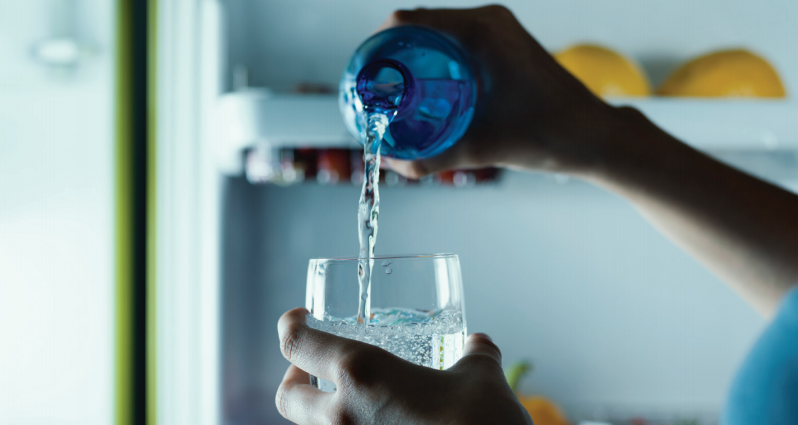 James Pearson, managing director for Danone Waters UK and Ireland, says: “Reducing our impact on the planet has always been at the heart of what we do at Danone. The challenges of plastic pollution and climate change that we face are more pressing than ever – therefore, we need to accelerate the actions to reduce our footprint.”
James Pearson, managing director for Danone Waters UK and Ireland, says: “Reducing our impact on the planet has always been at the heart of what we do at Danone. The challenges of plastic pollution and climate change that we face are more pressing than ever – therefore, we need to accelerate the actions to reduce our footprint.”
Also taking steps to fulfil its sustainability goals is Highland Spring, with a new target of achieving 50% recycled content in its bottles by 2022. Nichola Grant, channel marketing manager at Highland Spring Group, says that environmental sustainability is at the heart of everything the brand does.
She adds: “Sustainability is incredibly important to our retail partners and as we work towards our goals, we want everyone to know that every single Highland Spring bottle can be recycled, giving them another life.” In 2019, the brand also launched its first 100% recycled and recyclable eco bottle, which Grant says helps consumers understand the “value of plastic as a material which should be kept in the circular economy”.
Brands aren’t going about it quietly, either. In February, Glacéau Smartwater launched an out-of-home and radio advertising campaign to highlight to consumers that all of its bottles are made from 100% rPET and remain 100% recyclable. “Forty-two per cent of consumers look to brands and manufacturers to take the lead and make their packaging more sustainable and easier to recycle,” says Burgess. “Over the past year, we’ve focused on our ongoing sustainable packaging drive, encouraging consumers to dispose of bottles responsibly and join our effort in removing more virgin plastic from circulation.”
Bottled water on the go
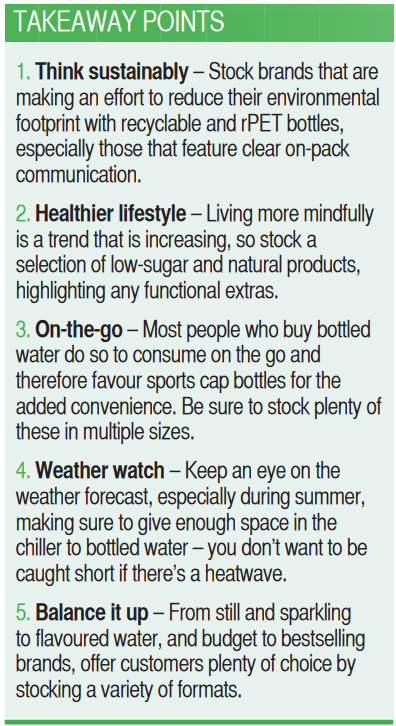
With the main occasion for buying bottled water being on the go, wholesalers should consider the formats they stock, including multipack and sports top. Buxton 50cl, 75cl and 1l bottles each have a sports cap, which the brand says appeals to shoppers looking for refreshments that can be easily consumed on the move. Similarly, Glacéau Smartwater’s larger, 850ml bottles also feature the convenient sports cap, which Burgess says are especially popular during the summer.
Plan ahead
The British summer weather is also anything but consistent. As Highland Spring alludes, 2019 was a challenging year for the whole category, in comparison to 2018, when the “phenomenal summer meant the demand for natural source water was at an all-time high”.
Though temperatures are hard to predict, wholesalers should make sure they’re always ready for a potential burst of sunshine. “The bottled water category is worth £857m in the off-trade, presenting a huge sales opportunity as consumers look to refresh and rehydrate,” adds Burgess. “So, offering a wide choice of different water products, including a range of variants and pack formats, is key to making the most of water sales.”
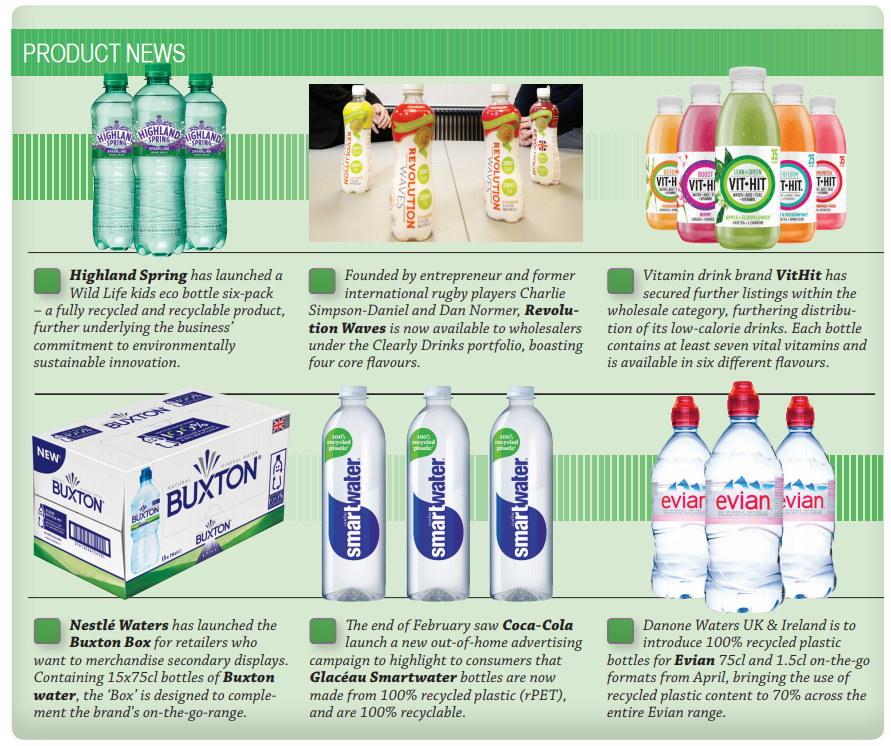
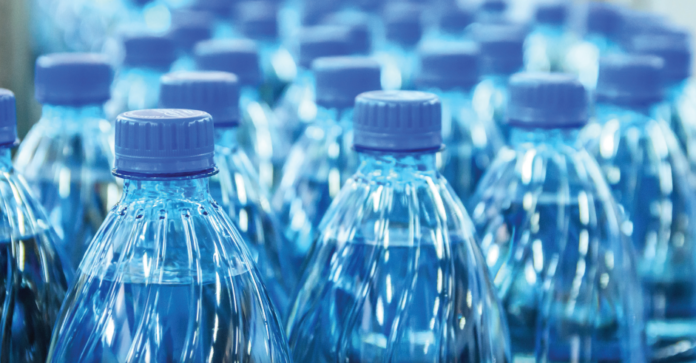







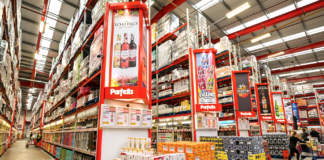
Thank you so much for sharing. Keep it up and update more information.